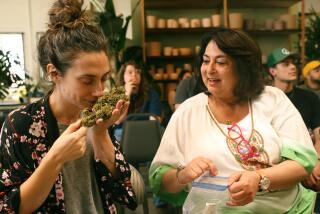Controversy Over Gene-Altered Seeds
- Share via
Genetically modified plants have yet to make it to the home gardener, but you wouldn’t know it from the disclaimers in various seed catalogs. “None of the seeds we sell are genetically engineered,” declares Heirloom Seeds of West Elizabeth, Pa.
“We do not support the development [of] genetically engineered seeds and will not sell them,” says the electronic version of the Cook’s Garden of Londonderry, Vt.
Robert L. Johnston Jr., founder of Johnny’s Selected Seeds in Albion, Maine, went so far as to post a 13-page, single-spaced position paper on the Internet, an exercise in hand-wringing over the pros and cons of inserting genes from one organism into another.
Why all the angst?
Biotechnology companies have so far concentrated on modifying agricultural crops for large-scale farming, producing potatoes that can ward off aphids, corn that poisons worms and soybeans immune from glyphosate herbicide.
Although the hobby gardener represents a tiny segment of the market to biotechnology companies, observers believe it is only a matter of time before home gardeners must choose whether to grow genetically modified seeds.
“In the seed trade, this is the hottest, most controversial” topic of the day, said Renee Shepherd of Renee’s Garden, a seed company in Felton, Calif. It is also on the minds of her customers: More and more are calling, mistakenly thinking genetic engineering has come to the home plot.
Others recognize that the biotechnology is still in the realm of agriculture but voice concern that the altered crops will damage their environment through the unintentional killing, for example, of beneficial insects. One study showed pollen from altered corn to be killing monarch butterflies. Other gardeners fear plants altered to contain the organic pesticide Bacillus thuringiensis, or Bt, will cause pests to build an immunity to it, rendering one of the biggest weapons in the organic arsenal useless in years to come.
Others disagree, saying genetically modified vegetables hold the promise of drastically reducing the amount of insecticides, herbicides and fungicides now used to raise fruits and vegetables.
“It’s complicated and hard to get past all the hype,” Shepherd said. “These are highly political issues, and they’re going to be played out over the next few years.”
George Ball Jr., president of the country’s leading supplier of seeds to home gardeners, W. Atlee Burpee & Co., said he hasn’t seen the gardening public galvanized by the issue.
“I would be much more concerned about the amount of chemicals on (store-bought) vegetables,” he said.
Nor does he see a back-to-the-land movement fueled by concerns that store-bought foodstuffs are tainted by genetically engineered crops. There is a tremendous interest in gardening, but it is inspired by the baby-boom generation aging and mellowing, he said.
“If genetically modified organisms was an issue with someone, it would be a low-level issue, as opposed to the pros and cons that drive people or prevent people from gardening,” he said.






